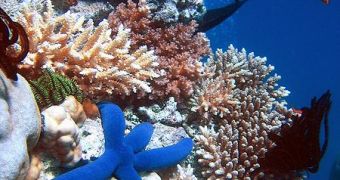Coral reefs are famous around the world for their beauty and for the fact that they are home to a huge diversity of marine species, much more so than any other place in the ocean. In a recent scientific study, it was proven that, in addition to housing these animals, the reefs also promoted evolution and adaptation, at a rate that was determined to be 50 percent faster than in any other marine ecosystem. The work is also based on fossil records stretching back more than 540 million years into the past.
In charge of the new investigation were German experts from the Humboldt University, in Berlin, who were led by scientist Wolfgang Kiessling. They report their conclusions in the latest issue of the top journal Science, the BBC News informs. The group reveals that coral reefs have only one other type of ecosystem that equals their ability to generate new species, namely the rainforests. In the researchers' own words, the reefs provide a “pump of new marine species.”
The team also expresses its concern related to the fact that these wonderful, evolutionary hot spots seem to be declining. Bleaching, ocean acidification, and the invasion of foreign organisms such as algae are the primary threats corals around the world need to deal with, and they appear to be losing. Their destruction would be equivalent to “losing an opportunity to create new species,” Kiessling, also the lead author on the Science paper, said. In their investigation, the specialists relied on a large amount of data, stretching back hundreds of millions of years into the past.
“We had the best documentation of the fossil record at our fingertips. And there was also the geological context there, so we knew where each species occurred. Our study shows that reefs are even more important than currently assumed. They are not only ecologically important for the marine environment, but also in an evolutionary sense,” the German expert told the British news agency.
“Studies like this provide conclusive evidence that reefs are centers of marine biodiversity. And now we see their importance in the evolutionary history of the planet,” the International Union for Conservation of Nature (IUCN) head of the Marine Program, Carl-Gustaf Lundin, said. According to official statistics, the world's oceans are losing about two percent of their coral reefs each year, and there is no clear indicator at this point that this trend is slowing down. Unless direct action is taken at the highest level to combat global warming, climate change, and their effects, the reefs could disappear within the next few decades, experts warn.

 14 DAY TRIAL //
14 DAY TRIAL //